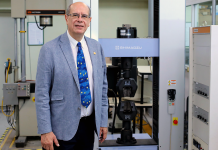
What’s a typical day like for you at JN Machinery?
We’re a small company, so, it really depends on what’s going on as far as projects. I’ll check in with the guys, see how far we are on a project, and then start answering any emails from overnight and catch up on work from the day before. But I always try to make time to update our history because I’m always learning more about our older ovens to make it easier to buy spare parts.
What does JN Machinery offer the heat-treat industry?
The owner’s father designed in-line ovens for the spring industry, and he worked for many different spring companies. He and his father are very well known in the spring industry after they had designed this process, and he made his own spring company so successful that he was able to sell it off, and then his father started this oven company. Word got out in the spring industry that this was the new way to do it, because they were all using big batch ovens before that.
We’re very well known in the spring industry. That’s definitely our bread and butter and always will be, but I’m excited for this sort of opportunity to get us out in front of people who don’t know us.
In a lot of ways, a big driving factor for the spring industry is the way the automotive market goes. And that’s always going to be our base; we’re not going to abandon it. I want to get a couple other ovens outside of that industry, because they’ve really been refined over the years to make maintenance very easy.
The ovens are very efficient; we go a long way to make them energy efficient, and that’s something that makes us pretty unique as opposed to some of the larger guys. We have an oven that’s 40 inches long and 5 inches wide — a really small oven that’s on one end of the spectrum. And then on the other end, last year we did our largest oven, which had a 58-inch wide opening, and it was 15 feet long, to do garage-door springs.
That’s really where we try to stand out: our customer service and our ability to be able to have that flexibility and range to do ovens from all sorts of sizes.
We’re able to really cater to our customers’ needs, as well as having the flexibility of many different ovens for many different operations. Because even now, I’d say we’re 90 percent in springs. We do have some people, especially with our larger 30-inch ovens, that they use for heat-treating. There’s a big customer of ours in Nashville that just needs to heat-treat rivets, and they run them at 1,200 degrees.
How do you work with a customer when they come to you with a challenge?
We probably did 75 to 80 ovens last year, and maybe five to 10 of those were truly custom. When someone wants something custom, we usually have a good idea of what they’re trying to do, for example: Do they want to do a tray oven where the motor is a step motor and each tray moves one position?
We’re not afraid to go visit a customer and learn the process. But for the most part, it’s pretty simple stuff: It’s an oven, and springs go in it. Some of them are more custom, which has led us to our line of paint systems.
We do coatings for springs, obviously, but it works well on some other applications. It’s basic rust protection.
It comes in a whole bunch of colors, and it works great for part identification. For really tiny springs, if there’s a left hook and a right hook on them, the poor guy assembling this hydraulic valve isn’t going to be able to tell the difference just by looking at them. But we can offer a painting system that’s attached at the end of the oven, where you — for a left and right hook — paint one blue and one red. Then you know which ones go where. It makes it easier for the end user to assemble the part.
We’re extremely customer service driven, that’s really where we try to stand out. Obviously, you can go get an overseas oven and get overseas service, but with us you are going to get a made-in-America product with made-in-America service.
Where do you see heat treat in the next decade and your place in that future?
We’re going to really try to focus on some things other industries are trying to do right now. Lights Out Operation, for example, where we’re making the ovens smart enough so the maintenance guy can sit at home with their iPad and be able to see what parts are running without anybody in the building. We also want to get it to — if our customers are able to pay for it — where we can offer a monthly service where we monitor ovens. Automation is going to be the absolute future, and everyone’s trying to do that right now. And they should be.
We want people to know we’re different from some of the larger guys, and we do offer really small ovens — all of them are electric, and all of our ovens are mobile. That’s a niche that’s, in some ways, underserved in the heat-treating industry. That’s where we can come in and make more of a footprint for ourselves in this industry.
MORE INFO jnmachinery.com

























